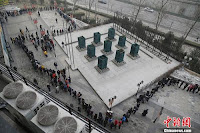APEC is an abbreviation of Asia-Pacific Economic Conference. The 2014 summit will take place in Beijing in a few days from today to Nov 12, 2014.
The Seagull gathers the most authoritative list of all everyday person cares to know about this conference. In order to present a neat and ordered city, residents and travellers are advised following policy changes:
- Transportation:
Beijing, Hebei, Tianjin and Shandong implement traffic control. Vehicles are allowed on the road according to their license plate numbers. Air travel will be delayed at major airports. Subway will skip certain stations, and limit capacity by deploying manned entrant doors. Vehicles with out-of-town licence plates will not be allowed into Beijing. Mail delivery to Beijing will be partially suspended, started Oct 20th, 2014.
The first APEC casualty was a 33 year-old girl who was pinned in between the security gate and the carriage door at the Huixinxijienankou (South Side of West Huixin Ave) of Line 5 in the evening rush hours of Nov 6. Because the subway system was running under human overwrite mode to handle unusually high volume of passengers driven by traffic control on the ground, automatic safety measures did not kick in when the passenger was stuck between two doors.
While enjoying the clear deep blue sky, the most beautiful autumn color of Beijing, foreign visitors should bear in their mind that the sacrifice Chinese people made for this damn conference. Remember to wash your hands before heading home, because they had been stained with blood.
The girl's name is Xiaomei Pan.
Beijing residents are advised not to open their street-facing windows. The notice warned them, otherwise they risk being mistakenly shot by snipers of the security forces from 'multiple countries'.
A fleet of Hongqi (Red-flag L6) with $1 million unit cost is deployed to transfer conference attendees.
- Eat:
Beijing will halt milk delivery, close restaurants and food stores in certain areas.
The conference center guarantee the last dish to the furthest table will be delivered within 4 minutes and 35 seconds after it was taken out of the wok.
- Living:
Beijing and Tianjin will postpone centralized heating by 15 days despite cold weather.
- Life:
Beijing will entertain dinners for the conference goers with extravagant fireworks in the middle of the city. Tianjin, on the opposite, will prohibit fireworks throughout the city.
- Death:
Funeral homes in Beijing will not be allowed to cremate closeth of the deceased.
The centralized appointment making service for all hospitals in Beijing will be shut down to discourage patients seeking medical help during the conference period. Hospitals will not treat outpatients unless its emergency. Among all the bizarre, this one is in particular hard to digest. Pictures on the right is the official 'holiday' schedule of Xuanwu Hospital, one of the largest hospitals in Beijing.
- Industrial:
Factories in Beijing, Tianjin, Hebei, Shangdao, Inner Mongolia and Shanxi were ordered to adjust or suspend production in the duration of the conference.
- Work:
The entire city of Beijing received a one week vacation time from Nov 7 to Nov 12. Residents are encouraged to travel to other places to leave an orderly city to the visitors.
- Cultural:
A book "Xi Jinping Talks on Ruling a Country" in multiple languages was published and provided at the Press Center.
- Architecture
A $1 billion conference center was constructed specifically for this conference. Hundreds of small shops in adjacent areas were converted to tourism shops.
The Great Leader Chairman Mao ignited Chinese people's aspiration with a famous saying, 'Man will conquer nature'. Apparently Beijing has accomplished just that, in terms of air quality and pollution control. By all means, this APEC 2014 is poised to surpass the Olympic 1936 as the most magnificent show of power in modern mankind history. After all, Socialists in Germany did not command the weather. Xi Jinping in China did.
Heil, Chairman Xi!












